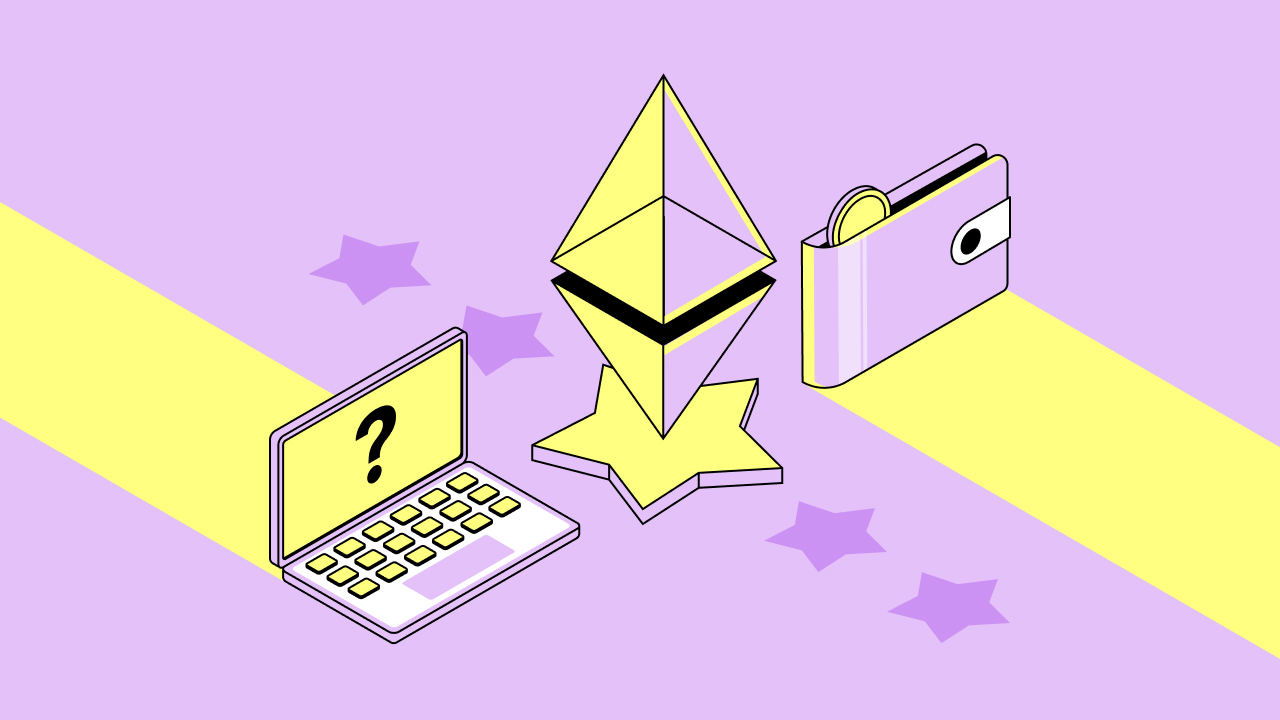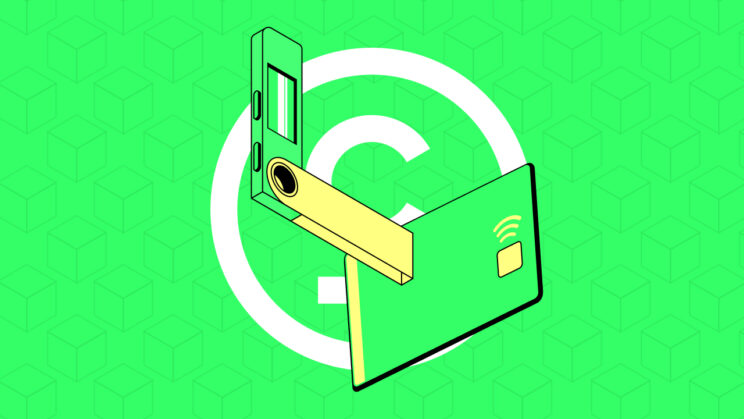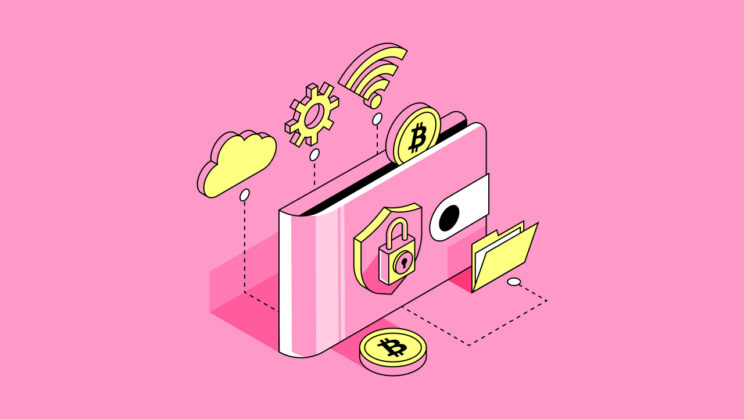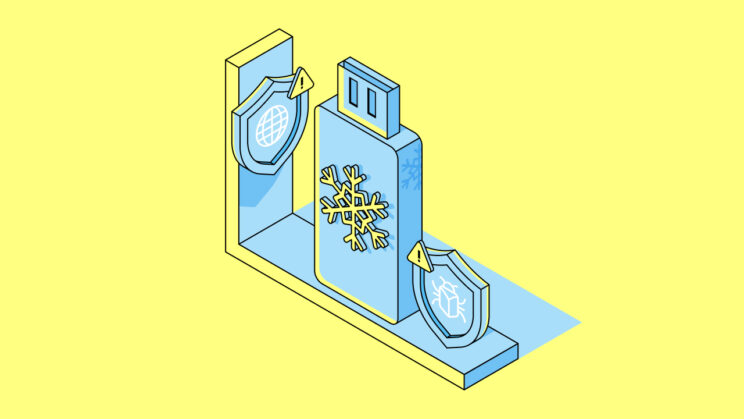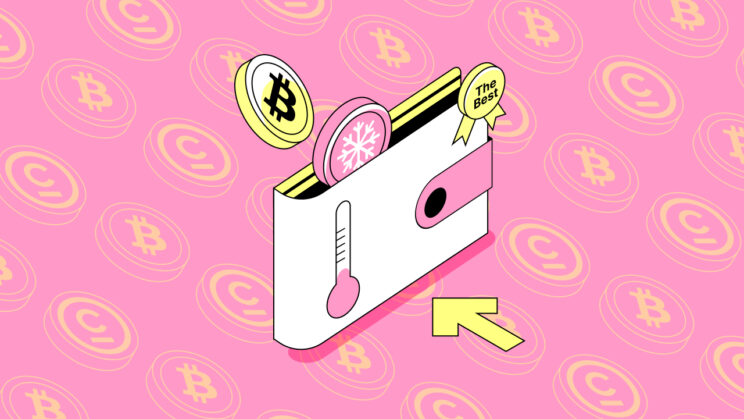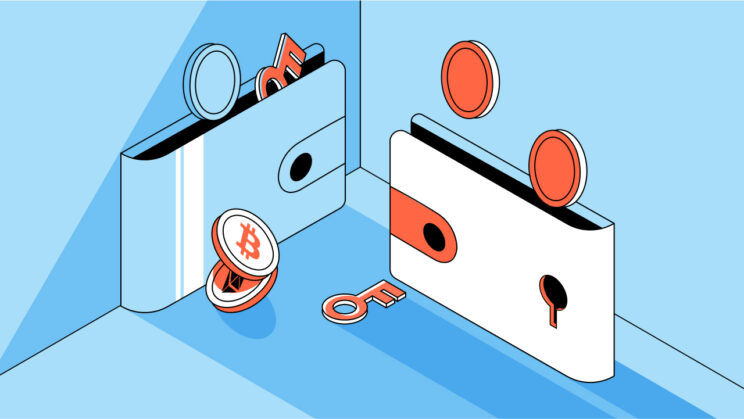In an era defined by digital innovation, cryptocurrency has emerged as a transformative force, reshaping the way we think about finance and technology. Its importance extends far beyond its role as a digital currency; it represents a fundamental shift towards decentralized, secure, and borderless transactions. At the heart of this revolution are ERC-20 tokens, a crucial building block in the Ethereum blockchain, and the key to unlocking the full potential of the crypto universe.
In this article, we’ll delve into the significance of cryptocurrency, explore the world of ERC-20 tokens, and discuss why using ERC-20 wallets is essential for harnessing the capabilities of these tokens. Whether you’re a seasoned crypto enthusiast or a newcomer looking to embrace the future of finance, understanding ERC-20 tokens and utilizing dedicated wallets will empower you to participate in this exciting digital frontier.
What is an ERC20 Wallet
An ERC-20 wallet, often referred to as an Ethereum wallet or Ethereum-compatible wallet, is a digital wallet specifically designed to store, manage, and interact with tokens that adhere to the ERC-20 token standard. ERC-20 is a widely accepted standard for creating fungible tokens on the Ethereum blockchain, which means that tokens following this standard are interchangeable and have the same value as other tokens of the same type.
Here’s a more detailed explanation of an ERC-20 wallet:
- Token Compatibility: An ERC-20 wallet is compatible with tokens built on the Ethereum blockchain that adhere to the ERC-20 standard. This includes a wide range of tokens, such as utility tokens, stablecoins, security tokens, and more. These tokens can represent various assets, including digital currencies, assets, or even voting rights within decentralized applications (DApps).
- Storage and Management: The primary function of an ERC-20 wallet is to securely store and manage these tokens. It keeps a record of the token balances associated with the wallet’s Ethereum address.
- Sending and Receiving: ERC-20 wallets enable users to send and receive ERC-20 tokens. Users can initiate transactions by specifying the recipient’s Ethereum address and the amount of tokens to transfer. The wallet then signs the transaction and broadcasts it to the Ethereum network.
- Balance Tracking: ERC-20 wallets continuously track the token balances associated with the wallet address. Users can check their token balances within the wallet’s user interface, which provides transparency regarding the holdings of different tokens.
- Interacting with DApps: Many decentralized applications (DApps) and decentralized exchanges (DEXs) require users to connect their wallets to interact with smart contracts and perform various blockchain-based functions. ERC-20 wallets are compatible with these DApps, making it easy for users to participate in activities such as trading, lending, and gaming.
- Security Features: A good ERC-20 wallet prioritizes security. This includes features like private key encryption, two-factor authentication (2FA), and backup options to ensure that users’ tokens are protected from unauthorized access or loss.
- Backup and Recovery: ERC-20 wallets often provide users with a recovery seed or mnemonic phrase that can be used to recover the wallet and its contents in case the wallet is lost or the device is damaged.
- Integration with Hardware Wallets: Some ERC-20 wallets can be integrated with hardware wallets, which are considered one of the most secure ways to store cryptocurrencies. This integration combines the convenience of a software wallet with the enhanced security of a hardware wallet.
7 Best ERC20 Wallets
| Wallet Name | Type | User-Friendliness | Security Features | Supported Platforms |
|---|---|---|---|---|
| Cropty Wallet | Mobile & Web | High | Strong encryption, PIN | Android, iOS, Web |
| Metamask Wallet | Browser Extension | Moderate | Seed phrase, Password | Desktop, Mobile |
| Trust Wallet | Mobile | High | Biometrics, PIN | Android, iOS |
| MyEtherWallet (MEW) | Web | Moderate | Keystore, Hardware wallet | Web |
| Trezor Wallet | Hardware | High | Offline storage, PIN | Desktop, Mobile |
| Exodus Wallet | Desktop & Mobile | High | Local encryption, Password | Desktop, Mobile |
| Ledger Wallet | Hardware | High | Offline storage, PIN | Desktop, Mobile |
Here is a list of 7 best ERC20 wallets with pros and cons:
Cropty Wallet
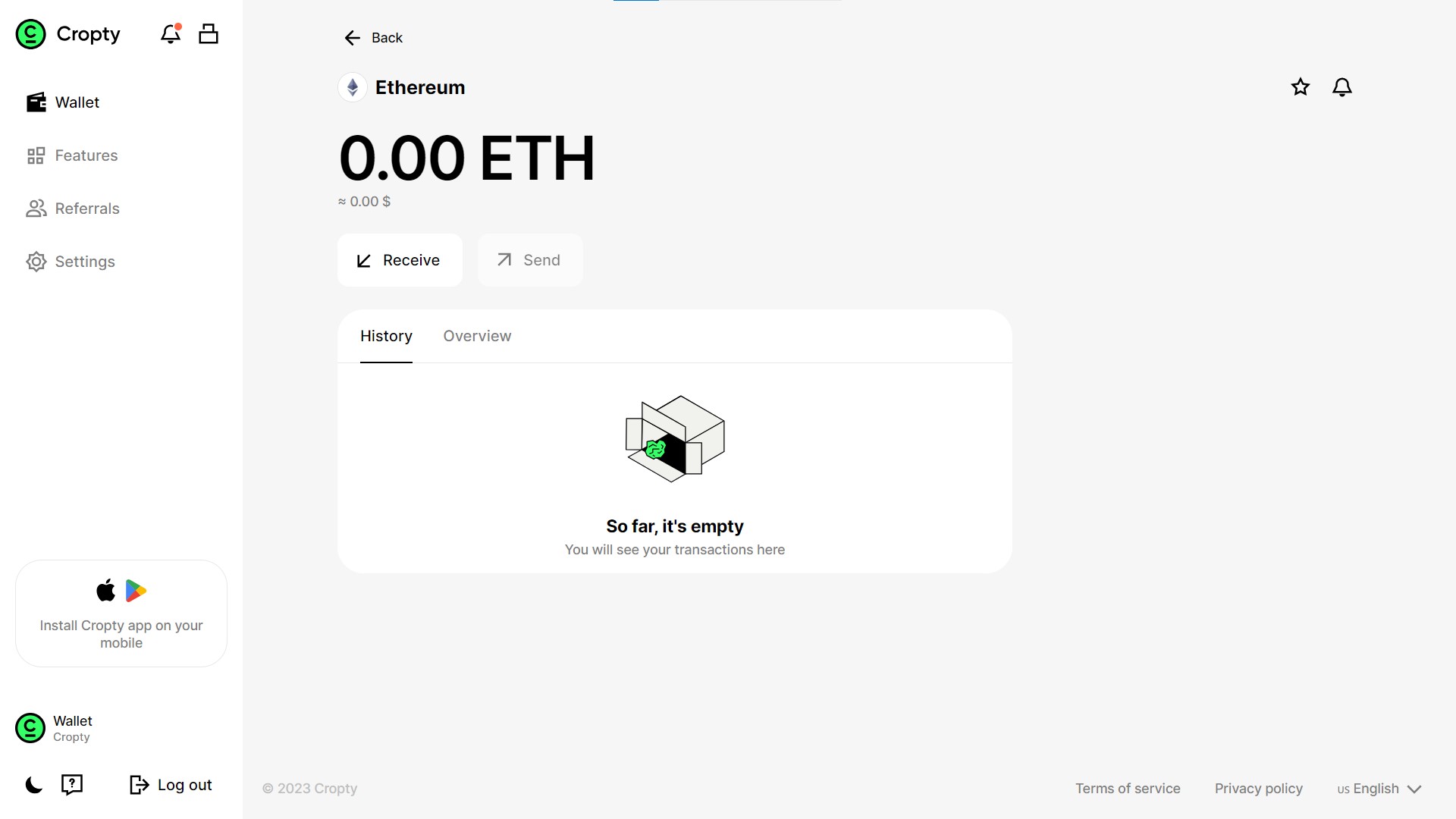
Description: Cropty Wallet is a custodial cryptocurrency wallet designed to offer secure storage and transfer of digital assets while simplifying the user experience. Unlike non-custodial wallets where users manage their private keys, Cropty operates with the assistance of a custodian or operator, providing an alternative solution for those who prioritize convenience and security.
Pros:
- User-Friendly Interface: Cropty Wallet boasts an intuitive and user-friendly interface that caters to both beginners and experienced users, making it accessible regardless of technical expertise.
- Quick Access to Loans: The wallet offers instant approval and no credit checks, providing easy access to loans with high loan-to-value ratios and flexible repayment terms.
- Secure Custody: Cropty Wallet ensures the secure custody and storage of digital assets, guaranteeing the safety of users’ funds with end-to-end encryption technology.
- Diverse Asset Support: Users can choose from over 40 supported cryptocurrencies, providing flexibility for those with diverse cryptocurrency portfolios.
- Multi-Blockchain Support: The wallet supports multiple blockchains, allowing users to choose from various options when topping up their balances.
- Mobile App: Cropty Wallet provides a mobile app for both Android and iOS devices, catering to users who prefer a mobile experience.
- Educational Resources: The platform offers an in-app crypto Academy, helping users expand their knowledge about cryptocurrencies and maximize their digital assets.
Cons:
- Custodial Nature: Cropty Wallet is a custodial wallet, meaning users rely on the custodian to manage their private keys. This contradicts the “not your keys, not your money” philosophy associated with self-custody.
- Limited APY on Earnings: The annual percentage yields (APY) for earning in the wallet range from 1% to 6%, with the flexibility to change daily. The offered APY rates might not be as competitive as other DeFi platforms.
- Conversion Requirement: To use some features, users may need to convert their cryptocurrencies, which can be inconvenient for those looking to use specific assets without conversion.
Metamask Wallet
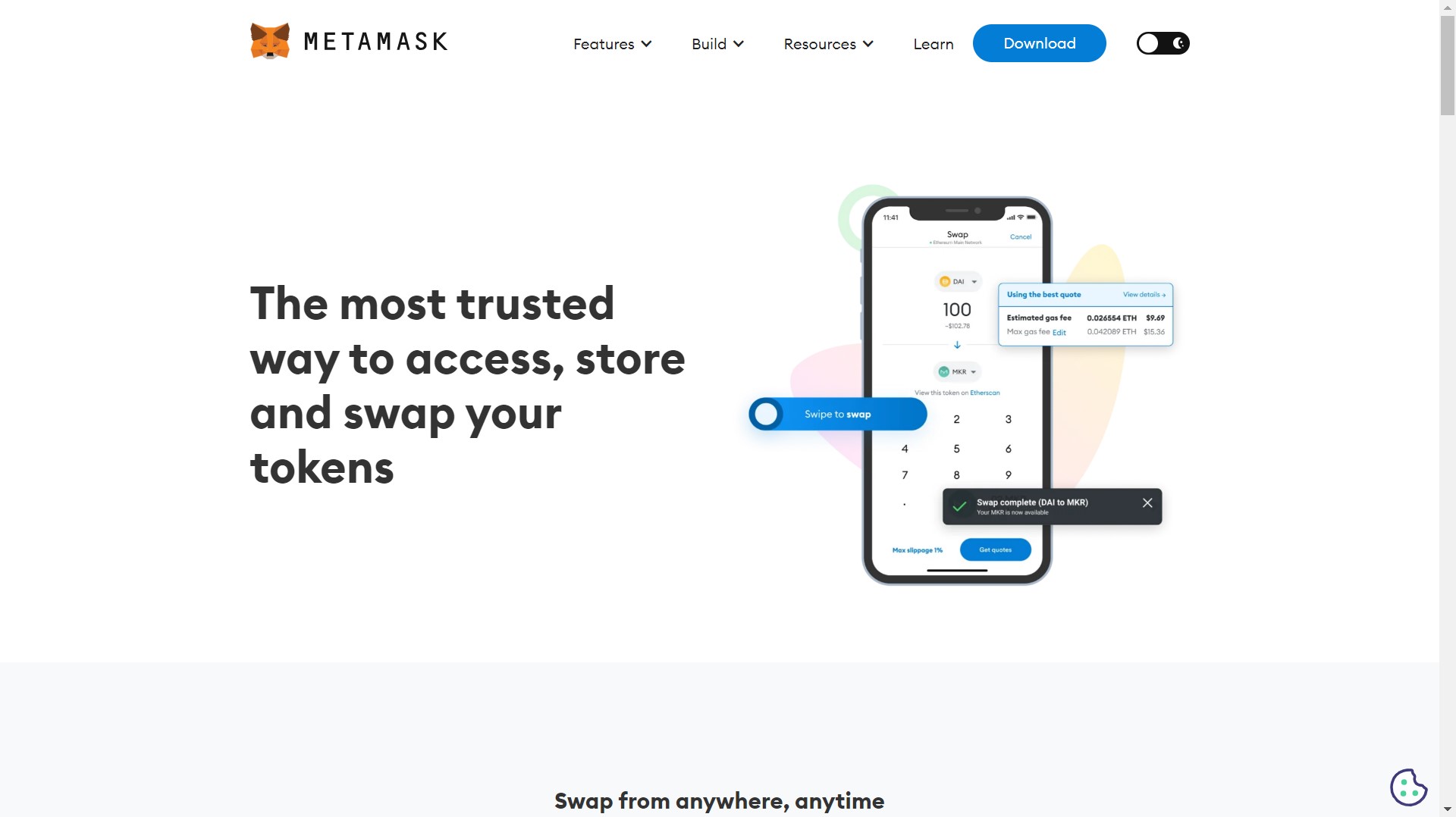
Description: Metamask is a popular cryptocurrency wallet known for its ease of use and strong support for the Ethereum blockchain and its associated tokens. It primarily serves as a browser extension but also offers a mobile app, making it accessible to a wide range of users. Metamask provides a non-custodial solution, giving users complete control over their private keys and digital assets.
Pros:
- User-Friendly: Metamask is known for its intuitive interface, making it an excellent choice for beginners in the cryptocurrency space.
- Customization: It offers advanced customization options, allowing users to manage their Ethereum-based assets efficiently.
- Security: Metamask uses a 12-word seed phrase for wallet recovery, ensuring security and control over funds.
- Browser Compatibility: It supports various web browsers, including Chrome, Firefox, Brave, Edge, and Opera.
- Hardware Wallet Integration: Metamask offers hardware wallet integration, enhancing security for users.
- DEX Integration: Users can easily access decentralized exchanges (DEXs) and swap tokens within the wallet.
- Community Support: Metamask benefits from a large and active user community, with extensive online resources and forums for assistance.
Cons:
- Limited Blockchain Support: Metamask primarily supports the Ethereum blockchain and EVM-compatible chains, limiting its versatility for users interested in other blockchain networks.
- Fewer Features: While it excels in Ethereum-related functionalities, it offers fewer features compared to wallets like Trust Wallet.
Trust Wallet
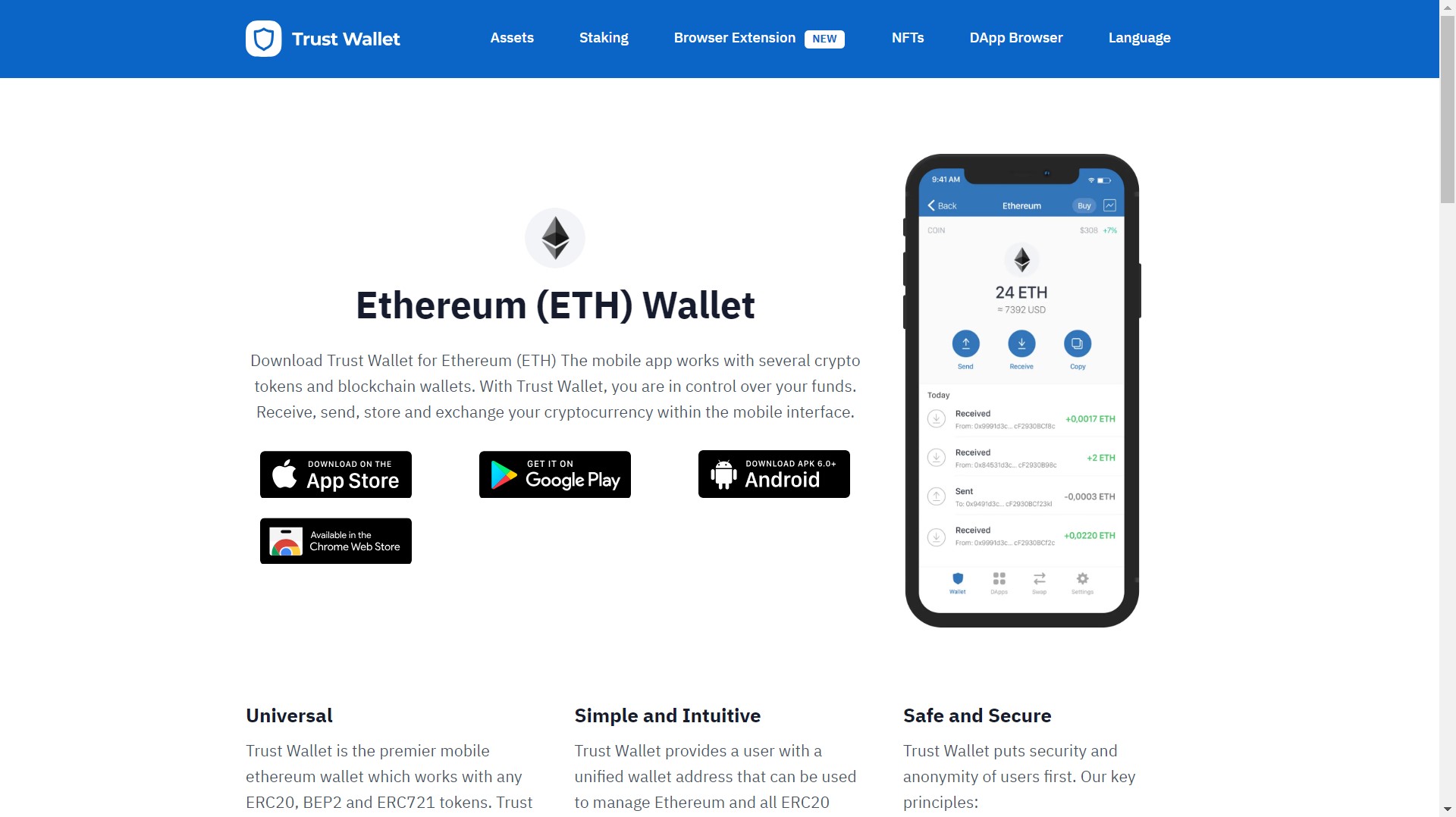
Description: Trust Wallet is a versatile cryptocurrency wallet designed for simplicity and widespread blockchain support. It caters to both newcomers and experienced users, offering a mobile-only application with non-custodial control over private keys. Trust Wallet has gained recognition for its support of various networks, including Bitcoin, Ethereum, and numerous other blockchains.
Pros:
- Multi-Network Support: Trust Wallet supports over 53 blockchain networks, making it suitable for users with diverse cryptocurrency portfolios.
- User-Friendly: It is designed to be user-friendly, making it a good choice for beginners.
- Staking Support: Trust Wallet offers staking support for assets across multiple chains, allowing users to earn passive income.
- NFT Support: It provides options for NFT enthusiasts, making it a go-to wallet for NFT collectors.
- Fiat Gateway: Trust Wallet facilitates the onboarding of fiat currency via third-party payment processors, simplifying the buying of cryptocurrencies.
- Native Token: Trust Wallet has its native governance token, TWT (Trust Wallet Token), which offers additional utility.
Cons:
- Mobile-Only: Trust Wallet is available as a mobile app only, which might not suit users who prefer a desktop experience.
- Limited Customization: It offers fewer customization options compared to Metamask, which might be a drawback for users seeking more control over their wallet’s functionalities.
MyEtherWallet (MEW)

Description: MyEtherWallet (MEW) is a user-friendly, non-custodial Ethereum wallet designed to provide secure access to the Ethereum blockchain for users looking to manage their Ethereum and Ethereum-based assets. Unlike custodial wallets or exchanges, MEW does not store users’ private keys or personal information on a server, which enhances security but also necessitates responsibility for managing one’s own keys.
Pros:
- User-Friendly Interface: MEW offers an intuitive and easy-to-navigate interface suitable for both beginners and experienced users.
- Secure and Self-Custody: MEW follows the principles of self-custody, meaning users have complete control over their private keys and wallet, enhancing security.
- Support for ERC-20 Tokens: Users can store, send, and receive Ethereum-based tokens, including popular ERC-20 tokens, making it versatile for ICO participation and managing a variety of assets.
- Transaction Customization: MEW allows users to customize transaction fees, enabling them to choose the speed and cost of their Ethereum transactions based on their preferences.
- Token Swap: The wallet offers a token swapping feature, allowing users to exchange one cryptocurrency for another directly within the wallet.
- Access via Hardware Wallet: MEW supports hardware wallets like Ledger Nano S and Trezor, providing an additional layer of security for storing private keys.
- Compatibility with Mobile Apps: MEW offers a mobile app for both Android and iOS devices, catering to users who prefer a mobile wallet experience.
Cons:
- Lack of Built-in Staking: MEW primarily focuses on asset storage and management and does not offer built-in staking features for users looking to earn rewards on their Ethereum assets.
- Non-Custodial Responsibility: While self-custody enhances security, it also requires users to safeguard their private keys diligently. Losing access to the private keys means losing access to the wallet and its funds.
- ERC-20 Token Management: Although MEW supports ERC-20 tokens, managing a large number of tokens may require more effort compared to wallets designed specifically for token management.
Trezor Model T Hardware Wallet
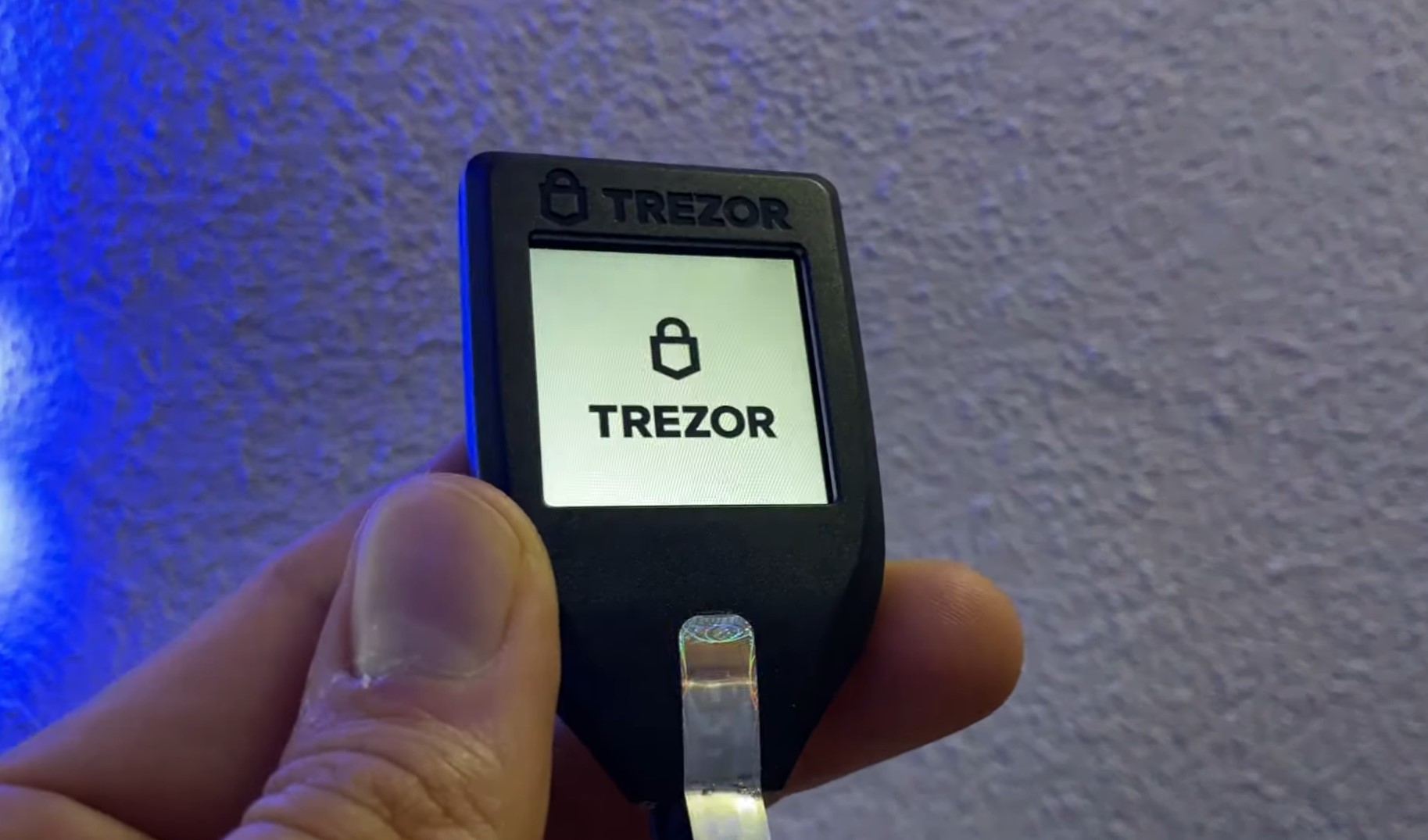
Description: The Trezor Model T is a renowned hardware wallet designed to provide a secure and user-friendly way to manage and store cryptocurrencies. Trezor has gained trust in the cryptocurrency community due to its commitment to security and open-source principles. The Model T, in particular, offers advanced features and functionality to meet the needs of both novice and experienced users.
Pros:
- Highly Secure: Trezor hardware wallets are known for their exceptional security standards. The Model T employs cutting-edge security measures, ensuring that your private keys remain offline and protected from potential threats.
- Open Source: The entire Trezor product suite, including the hardware device itself, is open source. This transparency allows users to verify the security of the device and its software independently.
- User-Friendly Touchscreen: The Model T features a user-friendly touchscreen interface, making it easy to navigate and interact with the device.
- Compatibility with Metamask and DApps: Users can connect their Trezor Model T to Metamask, enabling them to access decentralized applications (DApps) and interact with popular DeFi platforms securely.
- Seed Phrase Backup: During setup, users are required to create a seed phrase backup. This seed phrase is crucial for wallet recovery and provides an additional layer of security.
- Firmware Upgrades: Trezor regularly releases firmware updates to enhance security and add new features, ensuring that your device remains up-to-date.
- Cross-Platform Compatibility: The Trezor Suite, which accompanies the Model T, is compatible with both desktop and web versions, offering flexibility in how you manage your cryptocurrency assets.
Cons:
- Price Point: The Trezor Model T may have a slightly higher price point compared to some of its competitors. However, many users find the added security and features well worth the investment.
- Complexity for Beginners: While the Model T is user-friendly, some beginners may find the initial setup and security features somewhat complex. However, thorough documentation and resources are available to assist users in getting started.
Exodus Wallet

Exodus Wallet is a popular cryptocurrency wallet known for its user-friendly interface and support for a wide range of digital assets. Founded in 2015 by JP Richardson and Daniel Castagnoli, it aims to simplify the crypto experience for both beginners and experienced users. Here’s a concise summary of its key features and advantages, followed by some potential drawbacks.
Pros of Exodus Wallet:
- User-Friendly Interface: Exodus offers an intuitive and visually appealing platform, making it easy for users to manage their cryptocurrency portfolios.
- Multi-Asset Support: The wallet supports a diverse range of cryptocurrencies, allowing users to manage various assets in one place.
- No Registration Required: You can start using Exodus without the need for registration, KYC verification, or personal information, preserving your privacy.
- Built-In Exchange: Exodus features an in-house exchange for seamless cryptocurrency trading, with an option to integrate with FTX Exchange for lower fees and deep liquidity.
- Staking Simplified: Staking your assets, such as Solana and Cardano, is straightforward within Exodus, making it accessible for users interested in earning staking rewards.
- Compound Finance Integration: Users can earn interest on the Dai stablecoin through Compound Finance, often providing higher returns compared to traditional savings accounts.
- NFT Gallery: For Solana-based NFT enthusiasts, Exodus offers a dedicated NFT Gallery to securely manage and store digital collectibles.
- Security: Exodus is a non-custodial wallet, meaning you have full control over your private keys, enhancing security. It also supports hardware wallet integration for added protection.
Cons of Exodus Wallet:
- Limited Mobile Features: While Exodus has a mobile app, the desktop version offers more features and security. Mobile users may find certain functions lacking.
- Not Open Source: Exodus is not open-source software, which means the code isn’t publicly auditable by the crypto community.
- Third-Party Exchange Integration: To access certain exchanges with Exodus, users need to install third-party apps, which can be seen as an additional step.
- Ongoing Development: While Exodus has a strong track record, the fast-evolving crypto space requires continuous updates and improvements. Users should watch for future developments and updates.
- Exodus Shares Risk: Investing in Exodus Shares during its IPO involves risk, and users should perform due diligence before participating.
Ledger Wallet
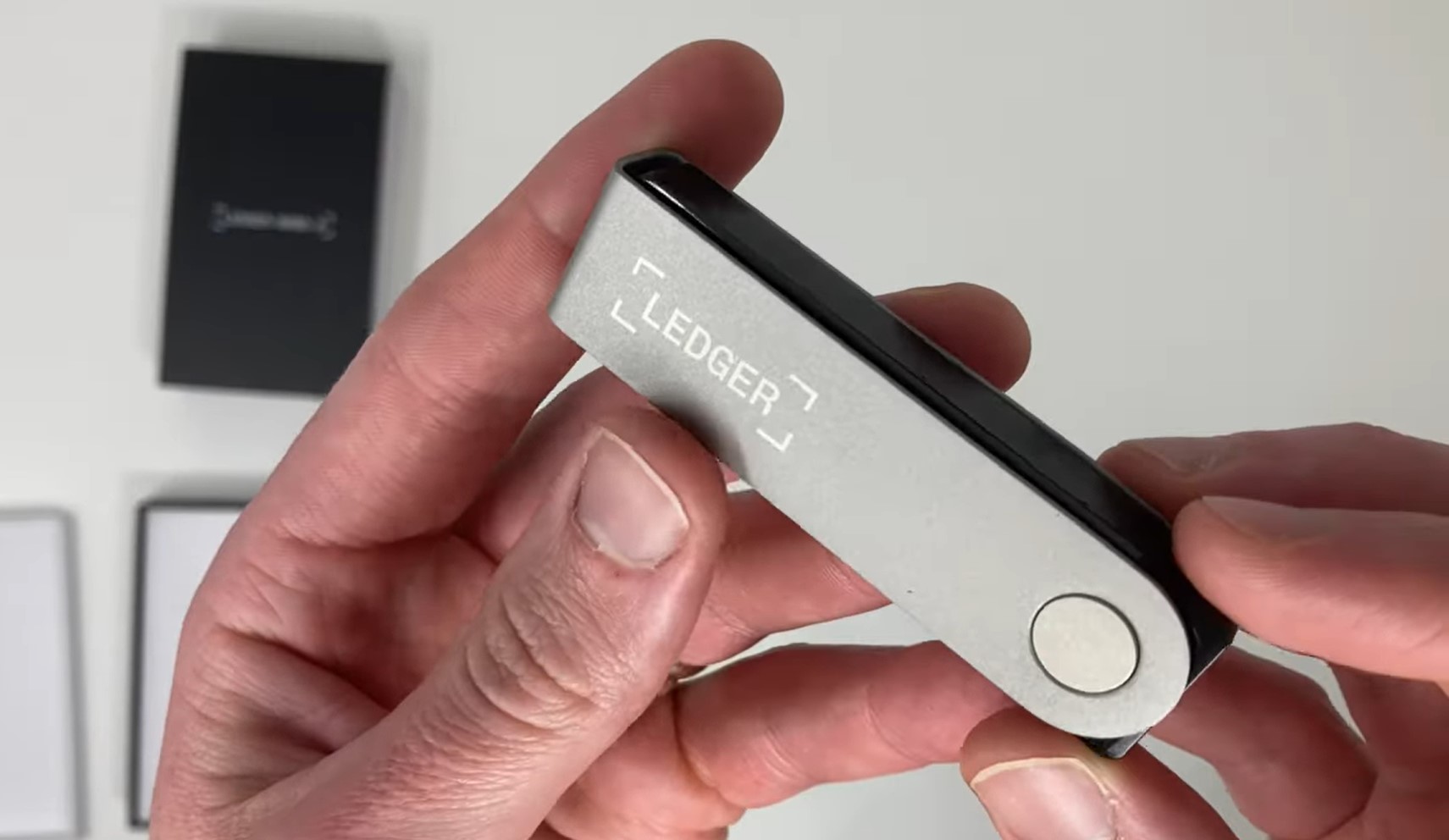
Ledger, one of the most trusted names in cryptocurrency storage hardware, recently introduced the Ledger Nano S Plus. In this article, we’ll explore whether this wallet is worth your consideration in your crypto journey. We’ll also compare the Nano S Plus to its predecessors, the Nano S and Nano X.
Pros of Ledger Wallet:
- Security Excellence: Ledger is renowned for its commitment to security. It employs Anssi Certification, making it the first and only hardware wallet certified by the French cybersecurity agency, ANSSI.
- Secure Chip Element: Ledger devices utilize tamper-resistant microprocessor chips to securely store sensitive data, including private keys, providing robust protection.
- Custom Operating System: Ledger developed its proprietary blockchain open ledger operating system (BOLOS) to safeguard devices against attacks and isolate applications for enhanced security.
- Genuine Check: Ledger ensures the integrity of your device with its Genuine Check authentication system, offering peace of mind against tampering.
- EAL5 Plus Certification: The secure element chip in Ledger wallets holds an EAL5 Plus certification, demonstrating its resistance to advanced attacks, a level comparable to passports and banking cards.
- Multi-Asset Support: Ledger devices support over 1800 cryptocurrencies and NFTs, making them versatile for managing diverse portfolios.
- Open Source: Ledger is open-source and developer-friendly, allowing users to add their own coins, develop apps, and integrate services into Ledger Live.
- User-Friendly: Despite its high-security standards, Ledger maintains a user-friendly interface suitable for both beginners and experienced users.
- Bluetooth (Nano X): The Ledger Nano X offers Bluetooth connectivity, enabling easy access to assets on mobile devices.
- Comprehensive Documentation: Ledger provides detailed documentation and step-by-step guides, simplifying the setup and management of your wallet.
Cons of Ledger Wallet:
- Cost (Nano X): The Ledger Nano X is more expensive than other Ledger devices due to its additional features, such as Bluetooth connectivity.
- No Battery (Nano S and S Plus): The Nano S and S Plus require a constant connection to a computer and don’t offer battery-powered mobility like the Nano X.
- Physical Storage: Ledger devices rely on paper recovery sheets for backup, which require careful and secure storage.
- Initial Learning Curve: While Ledger’s interface is user-friendly, newcomers to cryptocurrency may still need time to become familiar with wallet operations.
How to Choose a Crypto Wallet
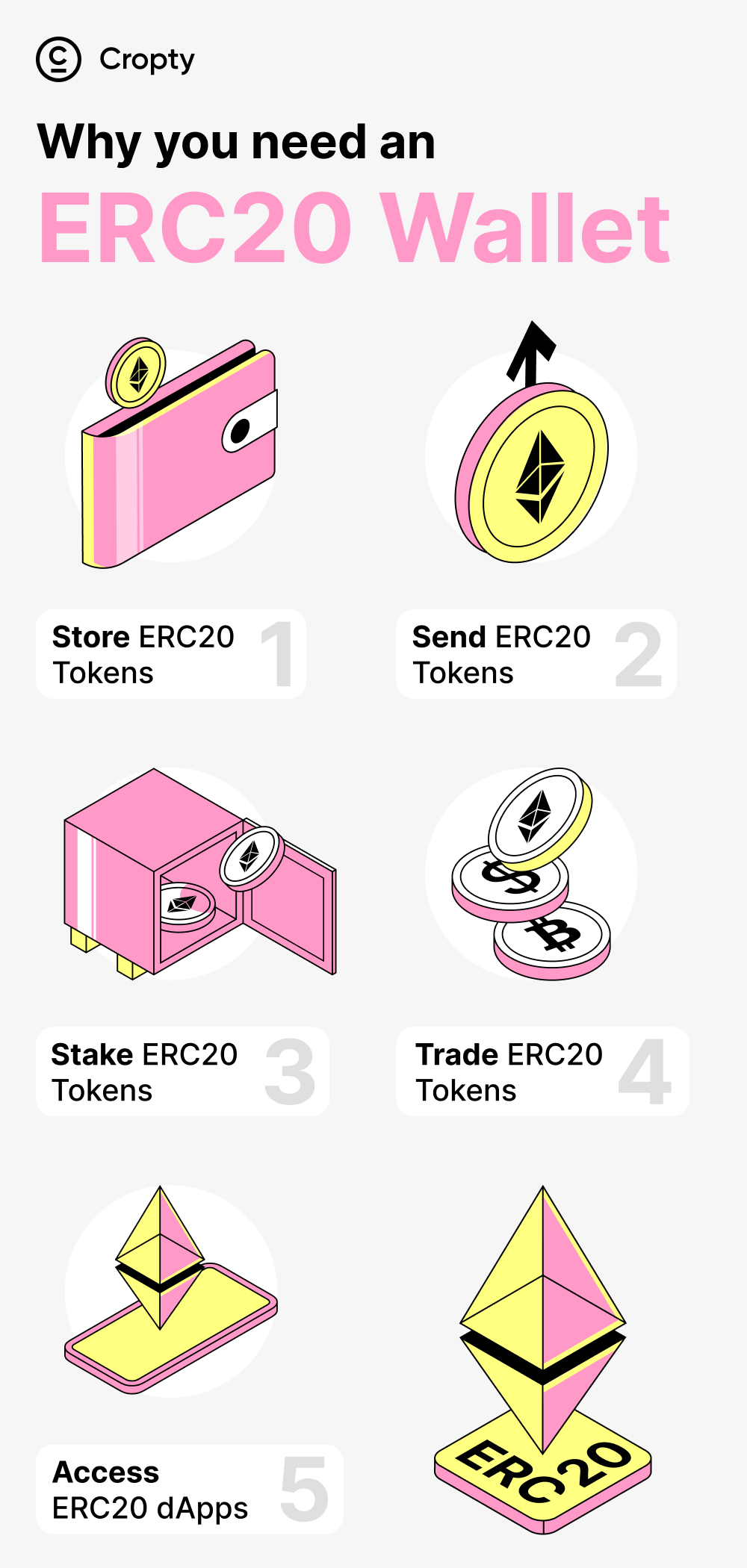
Here’s a list of tips on how to choose a cryptocurrency wallet:
- Understand the Basics: Start by understanding what a cryptocurrency wallet is. It’s not like a traditional wallet where your money is physically stored. Cryptocurrencies exist on the blockchain, and a wallet is a tool to access and manage them.
- Differentiate Between Hot and Cold Wallets: Learn the difference between hot wallets and cold wallets. Hot wallets are connected to the internet and are more vulnerable to hacking, while cold wallets store your private keys offline, making them more secure.
- Blockchain Knowledge: Get familiar with the concept of blockchain. It’s essentially a decentralized ledger that records all cryptocurrency transactions. Understanding this technology is crucial for selecting the right wallet.
- Public vs. Private Keys: Know the distinction between public and private keys. Your public key (wallet address) is like your bank account number, while your private key is like your login credentials. Keep your private key secret.
- Choose the Right Blockchain: Ensure that your wallet is compatible with the blockchain of the cryptocurrency you want to store. For example, a Bitcoin wallet won’t work for Ethereum.
- Secure Hardware Wallets: Consider using a hardware wallet for storing significant amounts of cryptocurrency. Hardware wallets store your private keys offline, making them highly secure.
- Buy from Trusted Sources: If you’re purchasing a hardware wallet, buy it directly from the official manufacturer to avoid potential tampering by third parties. Don’t buy used hardware wallets.
- Beware of Phishing Scams: Be cautious when accessing wallet websites. Check the URL for accuracy and ensure it uses HTTPS for security. Phishing scams are prevalent in the crypto space.
- Back Up Your Secret Phrase: When setting up a wallet that provides a secret phrase (seed phrase), write it down on paper and store it securely. Don’t store it online or in easily accessible digital formats.
- Small Test Transfers: When using a new wallet, send a small test amount of cryptocurrency to ensure everything works smoothly before transferring larger sums.
- Transfer from Exchanges: If you’re holding cryptocurrencies on an exchange, transfer them to your personal wallet for added security. Don’t leave significant amounts on exchanges.
- Diversify Wallets: Consider using multiple wallets, including hardware, mobile, and desktop wallets, to diversify risk. If one wallet has issues, you won’t lose all your funds.
- Regularly Update Software: If you’re using a software wallet, ensure that you regularly update its software to protect against vulnerabilities.
- Beware of Scammers: Be cautious of anyone requesting your private keys or seed phrase. Scammers often impersonate wallet providers or support teams.
- Education: Continuously educate yourself about cryptocurrency security practices and stay updated on the latest developments in the crypto space.
Remember that the security of your cryptocurrency holdings largely depends on your diligence in following these practices and choosing reputable wallet providers.
How ERC20 Crypto Wallets Work
ERC20 tokens are a type of digital asset or cryptocurrency that exist on the Ethereum blockchain. They are not independent cryptocurrencies but are built on and rely on Ethereum’s blockchain and platform. ERC20 tokens can represent a wide range of assets, not just traditional currencies like Ether. They can be used to represent shares of a company, loyalty points, gold certificates, and more.
To create an ERC20 token, a smart contract is used. This smart contract is responsible for not only creating tokens but also for managing transactions involving the token and keeping track of the balance of each token holder. To obtain these tokens, users send Ether to the smart contract, which then issues a certain amount of tokens in return.
Creating an ERC20 token involves writing a smart contract that can create tokens, transfer them between users, and maintain a record of users’ balances. However, creating a smart contract for token creation comes with risks. Once a smart contract is deployed, it cannot be changed or updated. Therefore, any errors or vulnerabilities in the contract can be catastrophic, potentially resulting in the loss of tokens or even theft.
Interoperability is another challenge. Each token contract can be unique, making it complex for exchanges and wallet providers to support hundreds of different tokens. To address these challenges and standardize the creation of tokens, the Ethereum community proposed the ERC20 standard.
ERC20 Standard
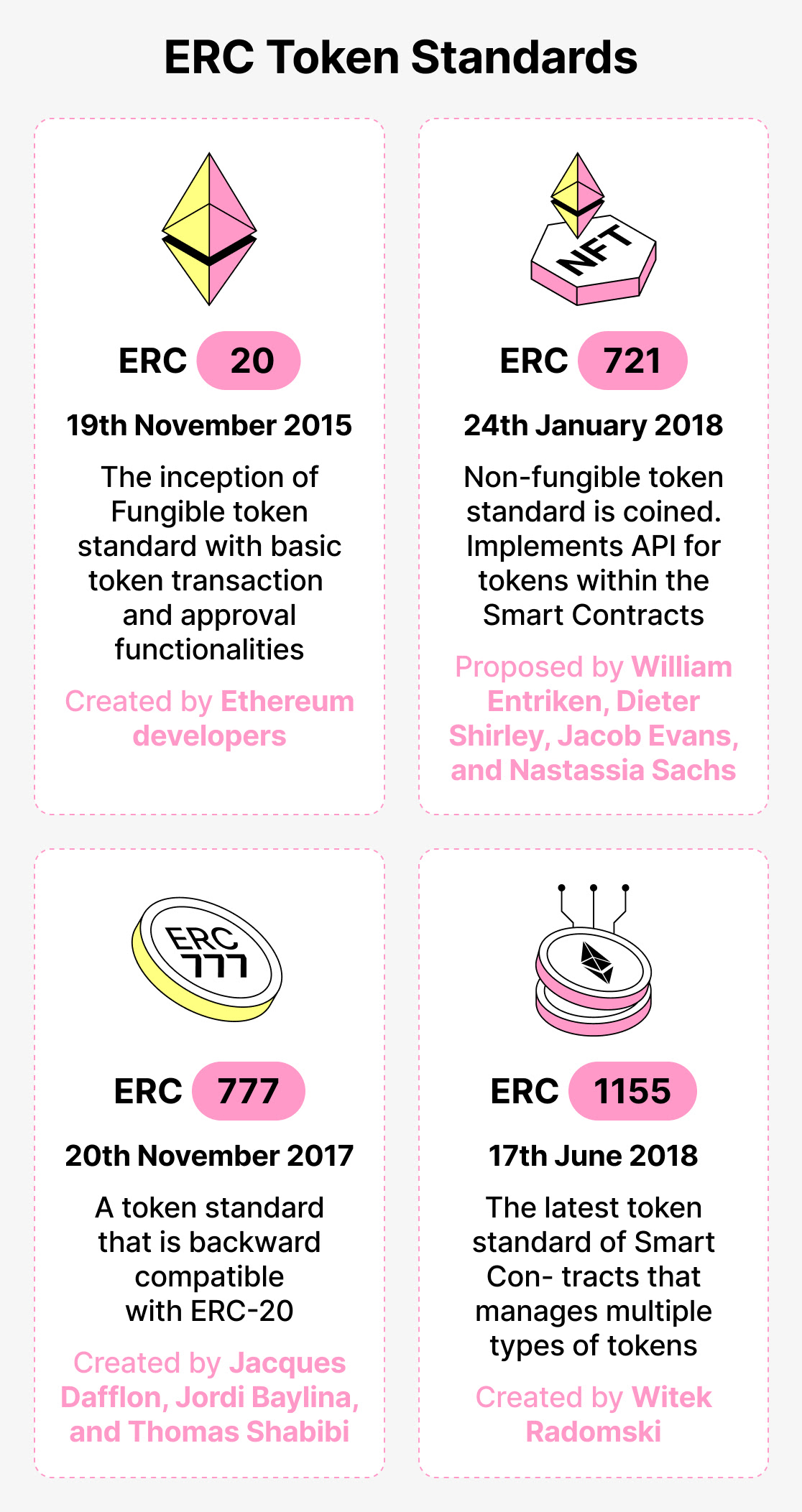
ERC20 stands for “Ethereum Request for Comments 20” and is essentially a guideline or standard for creating tokens on the Ethereum blockchain. It defines a set of functions that a smart contract should implement when creating tokens. These functions include:
- totalSupply: Specifies the total supply of the token.
- balanceOf: Returns the balance of a given address.
- transfer: Transfers a certain amount of tokens from one address to another.
- transferFrom: Allows token transfers between two addresses.
- approve: Grants approval for a specific address to spend a certain amount of tokens.
- allowance: Checks if one user has a high enough balance to send a certain amount of tokens to another user.
In addition to these mandatory functions, token creators can optionally provide a name, symbol, and specify how divisible the token is by defining the number of decimal places it supports.
ERC20 can be thought of as an interface in object-oriented programming. If you want your token to be considered ERC20-compliant, you must implement these six functions in your smart contract. Before the introduction of ERC20, every token contract was unique, requiring exchanges and wallet providers to write custom code for each token. With ERC20, these platforms only need to implement this code once, making it easier to add new tokens quickly.
Challenges and Improvements
While ERC20 has been instrumental in token creation and standardization, it is not without its challenges. For instance, some users mistakenly sent tokens to token contracts that were not designed to accept them, resulting in the loss of tokens. To address these issues, the community is working on extending the ERC20 standard with ERC223, which provides warnings about these risks and offers workarounds.
In summary, ERC20 tokens are digital assets built on the Ethereum blockchain, created using smart contracts that adhere to the ERC20 standard. This standard has significantly simplified token creation and enabled interoperability among different tokens, but it is not without its limitations and ongoing improvements.
